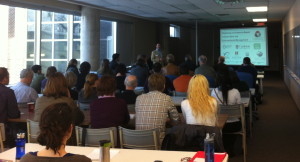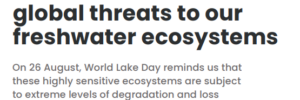This past Thursday, January 30th, sixty participants attended the Evidence-Based Conservation and Environmental Management Workshop at Carleton University. The focus of the workshop was “systematic reviews”, a relatively new concept in environmental conservation, but common practice
in the medical world.
Dr. Steven Cooke from Carleton University and the Canadian Wildlife Federation hosted the workshop, with special guest Dr. Neal Haddaway from the University of Bangor in Wales and the Centre for Evidence Based Conservation (CEBC).
Dr. Cooke began the workshop with an introduction to evidence-based conservation, a concept pioneered by Dr. Andrew Pullin from U of Bangor. The global Collaboration for Environmental Evidence (CEE) currently has four centres in the world with a
notable gap in North America, making Canada a prime location for a new hub. These centres provide a network of expertise in systematic reviews.
Dr. Haddaway introduced systematic reviews by providing a brief history of their use. He then delved into a detailed explanation of how to use systematic reviews as a tool for environmental management decisions.
The main benefits of systematic reviews are that they are transparent, repeatable, and objective. In essence, a systematic review should summarize all the evidence available and communicate these findings to the public and interested stakeholders. Aside from peer-reviewed reports and publications, some methods of communication even include youtube videos!
Dr. Haddaway continued the afternoon session by discussing case studies that clearly showed the 9 stages involved in a systematic review. This gave the audience a chance to comprehend the high levels of detail and effort that go into each project and the application of the output for environmental managers. The workshop was wrapped up with a focused discussion led by Dr. Cooke and Dr. Haddaway; this included identifying potential systematic reviews that would benefit environmental managers in Canada.
Attendees included professors, adjunct professors, undergraduate and graduate students from Carleton University and the University of Ottawa, members from Parks Canada, Fisheries and Oceans, and Environment Canada, conservation authorities, non-profit organizations, and interested citizens.
We would like to thank everyone who attended and made this workshop a success! A special thank you to Dr. Haddaway for traveling all the way from Wales to share his knowledge.
For more information on systematic reviews and evidence-based conservation, please visit the CEE and CEBC websites.








